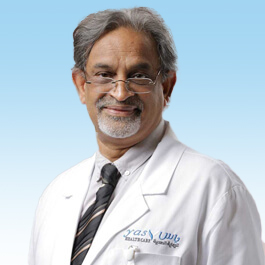

Cardiology Department
Located within our modern facility, Yas Healthcare’s Cardiology Department delivers expert, patient-centered care with the highest standards of clinical excellence.
Utilizing advanced technology and up-to-date diagnostic methods, our team provides comprehensive assessment, investigation, and management of patients with suspected or confirmed cardiac conditions. Our services typically include a combination of general evaluation, advanced non-invasive diagnostics, and advanced invasive procedures to ensure accurate diagnosis and optimal treatment outcomes.

Our comprehensive cardiac evaluation may include:
Comprehensive Clinical History
A detailed review of your medical history, symptoms, risk factors, and overall health status.
Thorough Clinical Examination
A complete physical examination with particular focus on the cardiovascular system, while also assessing other relevant systems.
12-Lead Electrocardiogram (ECG)
Performed in all cases, this test records the heart’s electrical activity at rest to help detect rhythm abnormalities and other cardiac conditions.
Chest X-ray (CXR)
Recommended in most cases, a chest X-ray provides information about the size and shape of the heart and major blood vessels, as well as important insights into lung health.
Urinalysis
Conducted in most cases, urine analysis can reveal important indicators of medical conditions that may influence the heart or cardiovascular system.
Blood Tests
Performed when clinically indicated, blood tests help identify conditions that may affect the heart. They also assess the function of vital organs such as the kidneys, liver, and thyroid, assisting your physician in determining the most appropriate and safe treatment plan.
Depending on your symptoms and initial assessment, your cardiologist may recommend additional non-invasive tests to better understand your heart health. At Yas Healthcare, we offer:
Holter Monitoring (24 hours to 7 days) – Continuous heart rhythm recording to investigate palpitations or irregular heartbeats.
Cardiac Event Recorders – Devices used to capture heart rhythm during occasional symptoms such as dizziness or fainting.
24-Hour Blood Pressure Monitoring – Tracks your blood pressure throughout the day and night.
Echocardiography (Heart Ultrasound) – Assesses heart structure, pumping function, and valves.
Stress Testing (Treadmill or Stress Echo) – Evaluates how your heart performs during physical activity or controlled stimulation.
Cardiac CT & Cardiac MRI – Advanced imaging to assess heart structure and detect coronary artery disease when indicated.
Vascular Ultrasound (Carotid, Peripheral & Renal) – Examines blood flow in key arteries to detect narrowing or circulation problems.
These advanced diagnostic tools help us provide accurate diagnoses and personalized treatment plans tailored to your needs.

Qualifications
M.B.B.S
Internal medicine, Germany
Consultant cardiologist, UK
Interest
Diagnostics